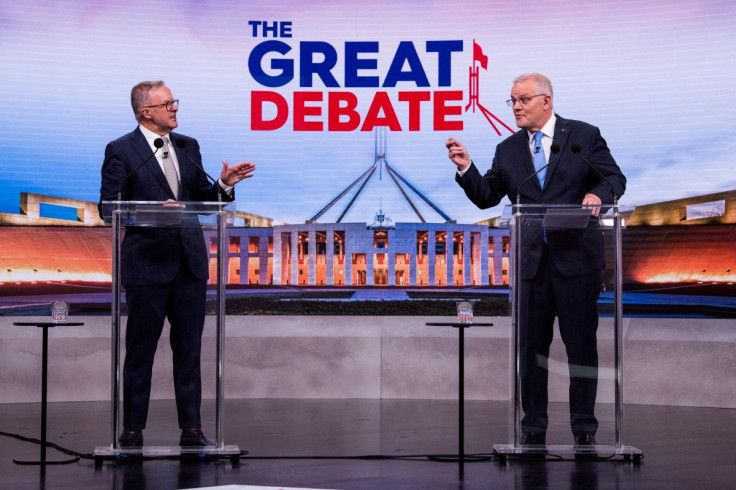Australia In Catch-22 Situation Over Chinese Secret Pact With Solomon Islands

Rarely has the Solomon Islands hogged the limelight like this. Australian caretaker Prime Minister Scott Morrison is very much against the gravitational pull of China and has made it a poll issue by politicizing the South Pacific island nation's pro-China tilt and its secret pact with the communist nation.
Australia will work with its allies to prevent China from setting up a military base in the Solomon Islands, located less than 2,000km (1,200 miles) from Australia, Morrison pledged during a poll debate on May 8.
China's pact with the Pacific island nation has become a hot political issue in the May 21 elections in Australia after the leaked pact revealed last month that Beijing had signed a security agreement with the Solomon Islands.
The caretaker prime minister had warned that a Chinese military base in the Solomon Islands would amount to crossing the red line.
Morrison, however, did not divulge the details of how Australia is planning to prevent a military base from being established on the Solomon Islands. It would be "unwise" to speculate on specific steps Australia is planning to take, Morrison added at the May 8 poll debate.
In the latest opinion polls, Morrison's conservative government is trailing, which has come in for scathing attack from the opposition for failing to prevent the Solomon Islands from signing the deal in a region where Australia has traditionally held influence.
Anthony Albanese, opposition Labor Party leader, has described the pact as a "massive foreign policy failure" in a televised debate. Albanese has promised closer ties between Australia and its South Pacific island neighbor if the Labor Party wins the elections.
According to Article 1 of the leaked pact, the Solomon Islands can ask China to send police, military personnel, and other law enforcement and armed forces to maintain social order and protect lives and property.
Besides, Article 5 notes that "neither party shall disclose the cooperation information to a third party" without the prior consent of the other party. This means even citizens of the Solomon Islands are not allowed to know the details of the secret deal.
The secret pact has an initial duration of five years but will be extended automatically for another five years unless specifically rolled back by either party.
"...I believe it is not in their national interest to have such a presence," Morrison said during the May 8 Sunday debate, according to AFP.
On May 6, Australia's foreign minister Marise Payne held talks with her Solomons counterpart in Brisbane where she repeated Australia's deep concern and decried the secret pact for its lack of transparency.
Australia has a bilateral security pact with the Solomon Islands and it sent a peacekeeping force to the country after civil unrest in November last year. But Australia had neglected the poor country by refusing to aid it economically, which forced it to side with China to get Beijing's massive financial assistance.
From its height in 2011, Australian aid to the archipelago dwarfed by 43 percent to US $129 million in 2019. Between 2009 and 2019, Solomon Islands suffered the largest cut from the Australian aid program. However, China has been the country's largest trading partner since Honiara decided to switch diplomatic ties from Taiwan to China. Reuters reported at the time that Honiara demanded a $100 billion loan from China to switch ties from Taiwan to China.
The Solomon Islands is in no mood to give in to the pressure tactics by Australia. Its prime minister, Manasseh Sogavare, has rebuked criticism leveled by Australia and the U.S.
Sogavare insisted that the pact with China was "nothing to be concerned about."
He has also informed the country's parliament that there had been a "warning of military intervention" over the pact with China.
"In other words, Mr. Speaker, we are threatened with invasion. And that is serious," Sogavare said. The threat of invasion was, however, denied by Morrison.
Though there is no specific mention of a military base in the secret pact, it is inevitable given that the pact covers logistical support. A military base in the Solomon Islands can complicate Australian defense planning.
There is an important strategic purpose behind China's actions in the Solomon Islands, which witnessed intense battles during World War II, as it offers an ideal location for China to threaten longitudinal and latitudinal lines of communication between the U.S. and its allies like Australia.
The Solomon Islands severed ties with Taiwan in 2019 in favor of diplomatic relations with China, and the secret pact follows it.
The U.S, which belatedly reopened its embassy in the capital Honiara, was caught napping on the China-Solomon Islands deal. The U.S. embassy has been closed in the country of 0.70 million people since 1993.
Earlier, Morrison said that Australia and the U.S. shared the same concerns in opposing a Chinese military base in the impoverished South Pacific island nation.
The U.S, which has unveiled an ambitious Indo-Pacific strategy aimed at containing China, has said it would initiate unspecified actions against the South Pacific island nation should the secret deal pose a threat to the U.S. or its allies.
Australia occupies a vital spot in the Biden administration's Indo-Pacific foray. That is the reason Morrison's tirade against the Solomon Islands was a part plea and part threat.
























